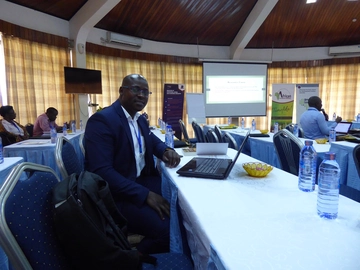"There is a need to reach more African students who can benefit and go back to make an impact in their own countries". Interview with Dr. Darlington Sibanda.
December 01, 2018.
Interview with Dr. Darlington Sibanda, who is a Development Researcher from Zimbabwe and an Alumnnus of the University of the Western Cape in South Africa. The interview took place during the 2nd DAAD Centers for African Excellence Alumni Conference in Akosombo, Ghana, where Darlington held a presentation which was titled: Towards inclusive Urban Land Governance in South Africa. He currently works as a researcher and educator. His PhD research was on Urban Land Tenure and Tenancy in South Africa. Other research interests are: Land Governance, Urbanization, Social Policy, Poverty and Inequality, Water and Sanitation Services, Social Protests. He received a DAAD stipend during his Master's study.
The network is called African Excellence and on this Conference we are talking about Africa in general. Africa has 54 countries, but in Europe many people still consider Africa as one nation. So what can we do to readjust this prejudice?
First of all, I would want to say that the idea of the Eurocentric borders came with Colonialism and everything else (that is connected to it). The way the borders were designed did not take into consideration that within one particular African country there might be different cultures, different languages, different tribes. So you find that within one country itself there is a diverse number of tribes who don’t necessarily agree on everything. That’s number one. Then number two: Africa, being 54 countries, is quite diverse. You find that Northern part of Africa, which is ideally Arab speaking and the religion as well is related to that. As we come down to Central Africa you will also find it’s quite diverse, we have francophone Africans, Anglophone Africans, Arab speaking Africans and so on. So it’s huge and diverse. The whole perception of one unified Africa does not exist.
What kind of contribution to Development issues is delivered by the DAAD programs?
The DAAD programs' current focus, particularly the one that I benefited from, is looking at Development Studies and how to work around the issue of policy and governance and to improve the governance in our countries. I feel there is more room to expand into equipping young black Africans to benefiting from their own resources. If DAAD can go the direction of identifying young black Africans who can go into studies which can focus on the management of natural resources, that would be huge and wonderful.
What impact did the DAAD-scholarship have on your career?
Huge influence. Studying currently is becoming very difficult in Africa and elsewhere. It’s very expensive, so to have an opportunity to start with the DAAD scholarship meant that I could focus on my studies, living more comfortably and do my best for my education.
And what do you think can be improved by the DAAD?
Well, I feel that there is this need to reach more students. Only a small number of students benefited. It will be far much better if we can have more talented African students who can benefit from that and go back to make an impact in their own countries.
The interview was conducted by Lani Marie Doehring, who is working with the Ghanaian-German Center for Development Studies at ZEF. The interview was held during the 2nd DAAD Centers for African Excellence Alumni Conference in Akasombo, Ghana. Read more about the conference <link https: www.zef.de media-center news news-single-view article external-link-new-window internal link in current>here.
You can read the interview with Dr. Fatuma Mninde-Silungwe, a lawyer from Malawi and Alumna from the South African German Center for Transnational Criminal Justice on "African women need to be economically empowered!" <link https: www.zef.de media-center news news-single-view article external-link-new-window internal link in current>here.


